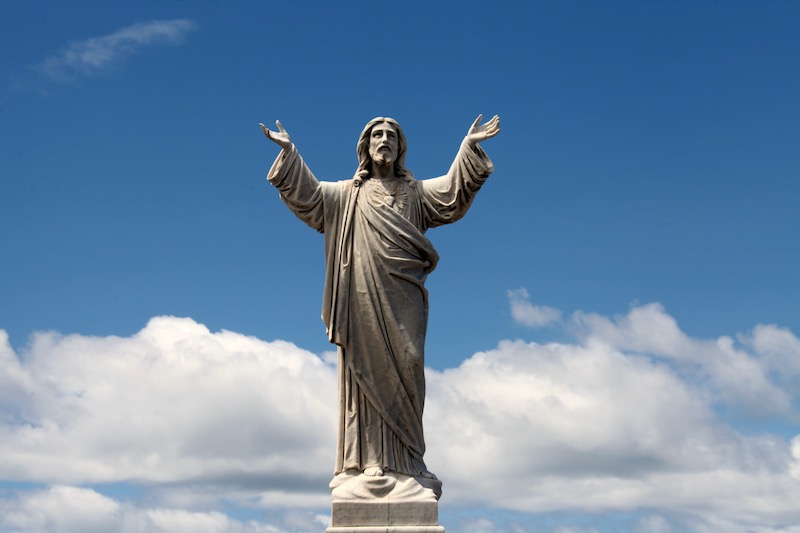Last week’s gospel was about a foolish rich man, whose foolishness was apparent in his avarice, the silliest of sins, because it trades on an illusion, the illusion of ownership.
In this week’s gospel, we’re shown another reason why avarice is the silliest of sins, namely, because it is blind to the abundance that's already ours, not through ownership but through sharing. Everything we have, including life itself, has been given to us, or better, shared with us. It follows that everything we have has been given to us to be shared, since that’s how we got what we have in the first place.
Jesus refers directly to the abundance that is already ours when he says at the beginning of today's gospel: “It has pleased your Father to give you the kingdom.” He then draws out three injunctions that follow from our great good fortune. He tells us, first, that if we have everything, we can afford to be fearless. Next, he says that if we have the Kingdom, we can afford to sell everything else and give the proceeds to the poor. And lastly, he tells us that even though we have the Kingdom, we're to be always vigilant and alert, our loins girt and our lamps burning, because the Son of Man is coming at an hour we do not know and at a time we least expect.
What’s interesting is that each of these injunctions appears to involve a paradox. Take the first: we’re told here that we’re to be fearless and unafraid: indeed, we’re told again and again throughout the gospels, “Do not be afraid’. And yet, we’re also constantly told that we must fear God. How is “fearing God” compatible with being fearless and unafraid? After all, normally, we fear those who might harm us, as opposed, that is, to our friends, who hold to themselves our best interests. God calls us his friends precisely because he has our ultimate interests at heart.
So, fearing God can't mean being afraid of him. Indeed, it could be said to mean the very opposite: in situations that would normally occasion fear, the fear of God is manifested, precisely, in our being fearless and unafraid; the fear of God, in other words, is seen in the absence of fear – of anything or anybody. To fear God is to fear nobody and nothing. To “fear” God is not to live in dread of him, but in awe of his goodness, beauty, holiness and unfailing love for us. It is, paradoxically, to be simultaneously conscious of all that we have and all that we lack; it is to experience what Peter experienced when he said to Jesus, “Leave me, Lord, for I am a sinful man”. And yet it is also to be filled at the same time with a confidence and trust that nothing can disturb.
The second injunction tells us that we should sell all our possessions and give the proceeds to the poor and, in this way – and this way alone – we will lay up treasure for ourselves in heaven. But again, this too appears paradoxical. It could be understood as a worldly counsel, advising a more effective way of laying up decidedly better treasure for ourselves: an act not so much of generosity as shrewd investment. And what about the poor in whose direction we shift our wealth? Will they not, by the same logic, be disadvantaged by having that of which we’ve disburdened ourselves? What about their “treasure in heaven”?
Look at what happened to the first Franciscans, who were dirt-poor by choice. Such was the pity for their plight on the part of the people among whom they lived and even of the Crown, they soon had gracious cloisters over their heads, and much else besides. The key is to realise that “laying up treasure in heaven”, means not laying up treasure anywhere. To lay up treasure in heaven is to find our security not in things – not even in spiritual things – but in God. To lay up treasure in heaven is to be disburdened altogether of anxiety-making acquisitiveness and, instead, to live in exquisite freedom. “Treasure in heaven” can never be lost, because there’s nothing, no “thing’, to be lost. To lay up treasure in heaven is to switch from getting to giving, from having to being.
And, yet, to have treasure in heaven, is to have everything. Which is why the inimitable Saint Francis of Assisi spoke of himself not as poor but rich. His poverty wasn't about having nothing, but about having been given everything, and settling for nothing less.
And finally, our Lord tells us: “Let your loins be girt and your lamps burning: stand ready, for the Son of Man will come at an hour you do not expect.” Now this saying has usually been understood to point to the dreaded day of judgement, the day of wrath and final reckoning, the day when all our misdeeds will be known and receive their just deserts and condign punishment, the Dies irae, dies illa/Solvet saeclum in favilla, the stuff of “hell, fire and damnation” sermons, beloved of a generation of preachers who seemed never so animated and never more cheerful than when contemplating the eternal damnation of their flocks.
Well, again, it certainly does refer, at least in part, to the coming of Christ and judgement in the future. But that judgement is not necessarily to be understood according to the gist of those bloodcurdling sermons. Whatever else it will be, judgement will occur when partial truth meets Truth itself; when the faint intimations of beauty we experience in this life, come face to face with Beauty itself; when all that is relative meets the Absolute; when the mystery which is us, meets the Mystery which is God; when, despite acknowledging all that we have done or not done, all that we are and have been, the possibility of absolute beauty, truth and love will be offered to us. We will be able, of course, to respond and choose then, only with the self we've become through our free choices here and now. In that sense, we are our own judges. If there is anybody in Hell, it is full of people in a permanent state of denial, endlessly and hopelessly justifying themselves to themselves, complaining that they had nothing to repent of. In the end, they damn themselves because, even in the presence of God’s utter goodness and beauty, and the certainty of his unfailing love for us, unlike Peter’s “Leave me, Lord, for I am a sinful man”, they were unable to admit and acknowledge their sins.



 Loading ...
Loading ...
What do you think?
You can post as a subscriber user ...
User comments (0)